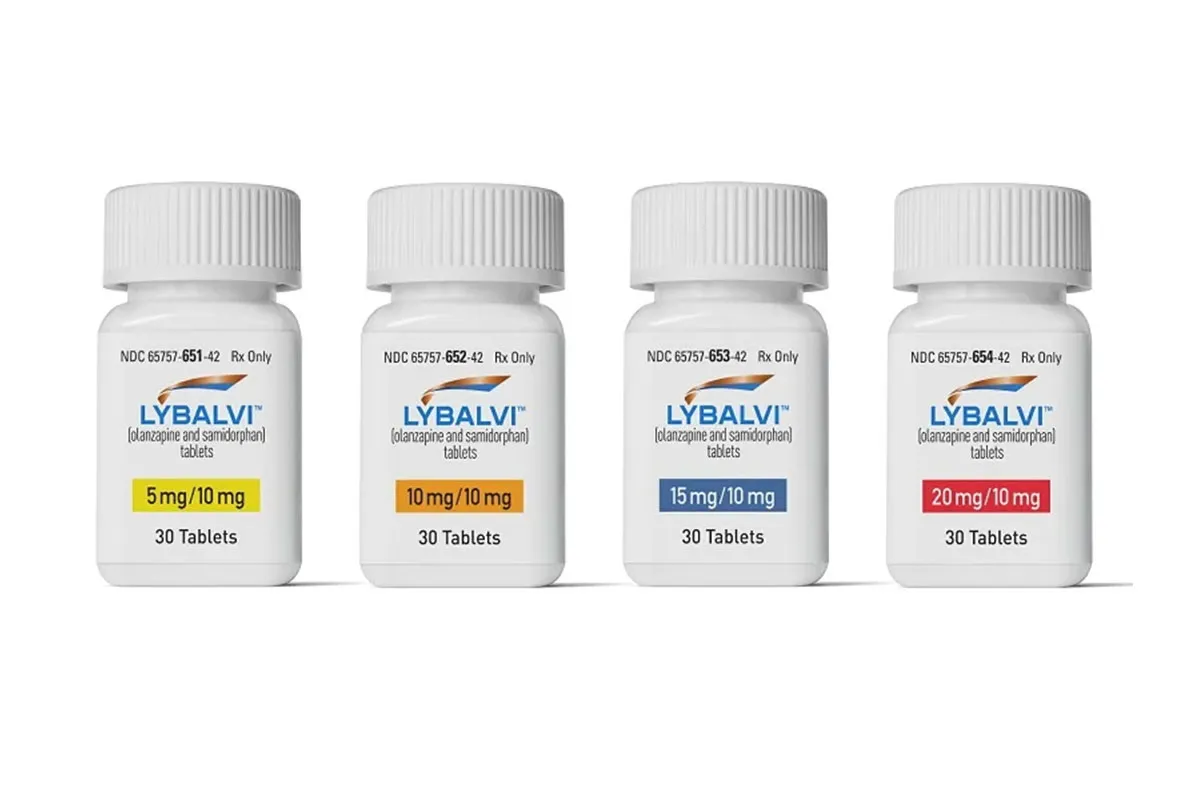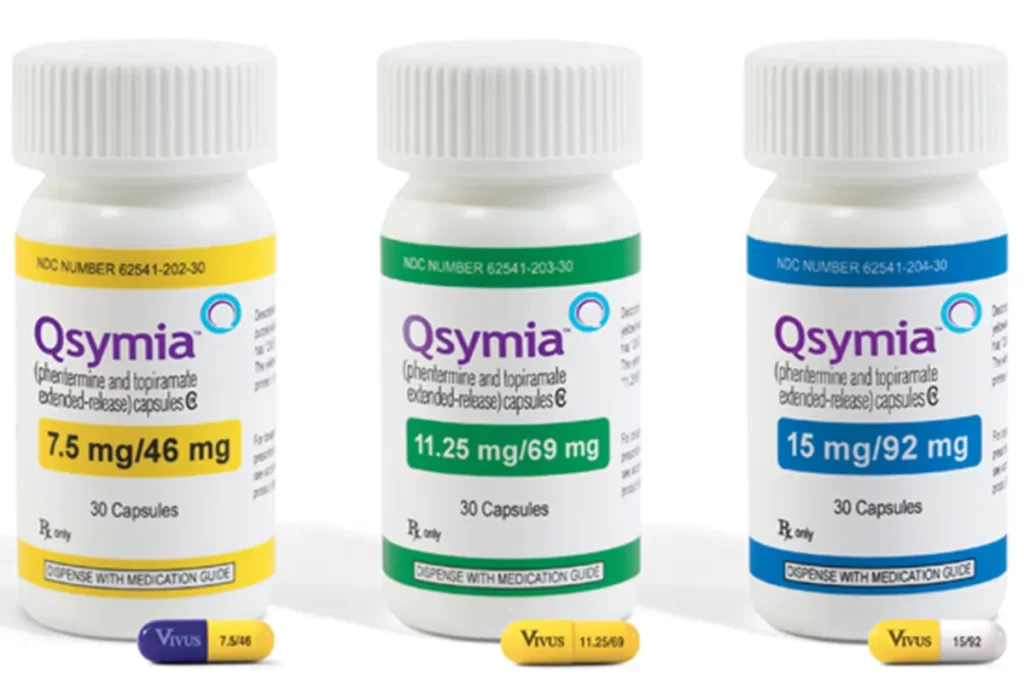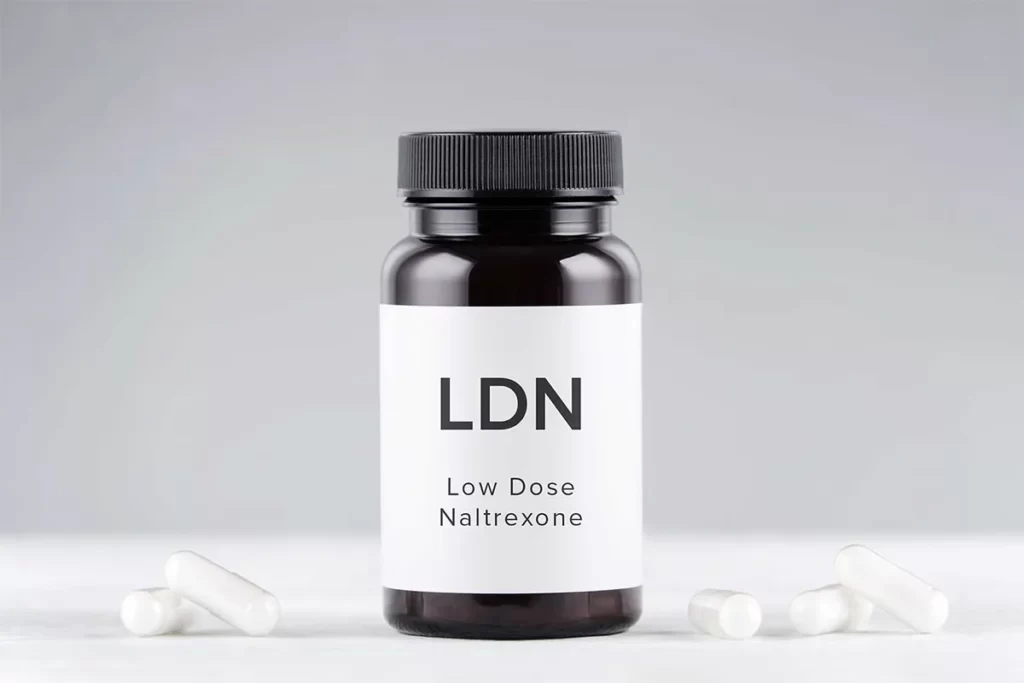Managing Lybalvi Weight Gain: Tips for a Balanced Approach
-
 Written by
Michael J. Ormsbee
Written by
Michael J. Ormsbee
- LAST UPDATED November 1, 2023
Lybalvi, an innovative medication that blends olanzapine with samidorphan, is designed to treat adults with schizophrenia, bipolar I disorder, and as an adjunctive therapy for major depressive disorder. The unique combination aims to harness the therapeutic benefits of olanzapine while minimizing its associated weight gain through the addition of samidorphan. In understanding the side effects of any medication, it’s crucial to consider both the potential benefits and risks. When it comes to Lybalvi, weight gain is a prominent concern for many prospective users, given the historical ties between olanzapine and significant weight increase. Addressing this, a careful examination of Lybalvi weight gain dynamics is indispensable for anyone considering this medication. By delving deep into the relationship between Lybalvi and weight fluctuations, users can make informed decisions, ensuring they’re equipped with the knowledge needed to navigate their health journey successfully. This article aims to provide a comprehensive analysis of Lybalvi, with a special focus on its potential impacts on weight, arming you with the necessary insights to make the right choice for your health needs.
Lybalvi: An Overview and its Connection to Lybalvi Weight Gain
Lybalvi is a novel medication that aims to provide the benefits of antipsychotic treatment while mitigating some of the common side effects associated with such medications, notably Lybalvi weight gain. A significant concern with antipsychotic medications, particularly olanzapine, is their propensity to cause weight gain in individuals. This is where Lybalvi steps in as a game-changer, combining olanzapine with samidorphan to minimize the likelihood of weight gain.
How Lybalvi works
Understanding how Lybalvi works necessitates a look at its two main components. Olanzapine, a well-established antipsychotic, works by affecting the balance of neurotransmitters in the brain, particularly dopamine and serotonin. This, in turn, helps to manage symptoms of mental health conditions like schizophrenia and bipolar disorder. Samidorphan, on the other hand, is an opioid antagonist. It works by blocking the effects of opioids in the brain, and in the case of Lybalvi, it’s thought to counteract the weight-gaining effects of olanzapine.
The dual action of Lybalvi, through olanzapine and samidorphan, creates a synergy that offers the best of both worlds for individuals in need of antipsychotic treatment. While olanzapine works to alleviate symptoms of mental health conditions, samidorphan works to keep the potential Lybalvi weight gain in check. This innovative approach is what makes Lybalvi stand out from its counterparts.
Clinical studies have provided evidence to support the efficacy of Lybalvi in managing mental health symptoms while reducing the risk of weight gain. In a study comparing Lybalvi to olanzapine, it was observed that individuals taking Lybalvi experienced less weight gain than those taking olanzapine alone. This is a significant breakthrough, as it addresses one of the major drawbacks associated with olanzapine, without compromising its therapeutic benefits.
Despite its promise, it’s important to note that Lybalvi weight gain is still possible, albeit to a lesser extent than with olanzapine alone. Like any medication, Lybalvi comes with its own set of potential side effects, and weight gain is one of them. However, the addition of samidorphan is designed to minimize this risk, providing a more balanced treatment option for individuals dealing with mental health conditions.

The conditions Lybalvi is used for
Lybalvi is a revolutionary medication designed to address various mental health conditions while mitigating the side effects commonly associated with antipsychotic treatments, such as Lybalvi weight gain. This medication is approved for use in adults and is employed to treat several mental health conditions.
- Schizophrenia:
Schizophrenia is a chronic mental health condition characterized by distorted thoughts, behaviors, and feelings, often disconnecting individuals from reality. Symptoms can include hallucinations, delusions, and impaired cognitive functions. Lybalvi works to alleviate these symptoms, allowing patients to have a clearer and more coherent thought process.
- Bipolar I Disorder:
Bipolar I Disorder is marked by episodes of manic highs and depressive lows. Lybalvi helps to stabilize mood, reducing the severity and frequency of these episodes. By doing so, patients experience fewer extreme mood fluctuations, enabling them to lead a more balanced and stable life.
- Major Depressive Disorder (as an adjunctive therapy):
Major Depressive Disorder is characterized by persistent feelings of sadness, loss of interest, and other emotional and physical symptoms. When used as an adjunctive therapy, Lybalvi assists in lifting the veil of depression, fostering improved mood and overall well-being.
The innovation behind Lybalvi lies in its composition, combining olanzapine with samidorphan. While olanzapine effectively manages mental health symptoms, it is commonly associated with significant weight gain. The inclusion of samidorphan aims to counteract this side effect, minimizing the risk of Lybalvi weight gain experienced by users.
In clinical trials, Lybalvi has shown promise in managing mental health symptoms while curbing the risk of weight gain. Patients on Lybalvi reported experiencing less Lybalvi weight gain compared to those on olanzapine alone. This is a major breakthrough, as it addresses one of the primary drawbacks of olanzapine, allowing patients to reap its benefits without the associated weight gain.
Unraveling the Association Between Lybalvi Weight Gain
Discuss the association of Lybalvi with weight gain
One of the significant concerns that often comes with antipsychotic medications is their potential to cause weight gain, and Lybalvi is no exception. While Lybalvi represents a significant advancement in the realm of antipsychotic drugs, it is crucial to delve deep into its association with weight gain.
Lybalvi, a combination of olanzapine and samidorphan, is specifically formulated to mitigate the weight gain commonly associated with olanzapine, a widely used antipsychotic known for its efficacy in treating conditions like schizophrenia and bipolar disorder. The addition of samidorphan, an opioid antagonist, works to counteract the weight-gaining effects of olanzapine, thereby minimizing the risk of Lybalvi weight gain.
Clinical trials and studies have shown that while Lybalvi weight gain is still a potential side effect, the extent of weight gain is significantly less compared to olanzapine alone. This is a pivotal point that sets Lybalvi apart from its counterparts. The innovative approach of combining olanzapine with samidorphan proves to be effective in striking a balance between managing mental health symptoms and minimizing weight gain.
However, it is important to note that the risk of Lybalvi weight gain is not eliminated. Just like any other medication, Lybalvi has its set of potential side effects, and weight gain is one of them. Various factors such as individual metabolism, lifestyle, and dietary habits can also play a role in determining the extent of weight gain experienced by the user.
In managing Lybalvi weight gain, it is recommended that patients to engage in regular physical activity, maintain a balanced diet, and consult their healthcare provider for personalized advice and recommendations. Regular monitoring of weight and body mass index (BMI) can also be beneficial in keeping track of any significant changes that may occur during the treatment.
Compare Lybalvi’s weight gain potential with olanzapine
Olanzapine, a commonly prescribed antipsychotic, is effective in treating conditions such as schizophrenia and bipolar disorder. However, one of its notable side effects is significant weight gain. This has led to the development of Lybalvi, a medication that combines olanzapine with samidorphan, an opioid antagonist designed to minimize the risk of weight gain.
Let’s look at the data presented in the form of a table to compare the weight gain potential of Lybalvi and olanzapine:
| Factor | Lybalvi | Olanzapine |
|---|---|---|
| Active Ingredients | Olanzapine + Samidorphan | Olanzapine |
| Weight Gain Potential | Moderate (Less compared to olanzapine) | Significant |
| Mechanism of Action | Olanzapine treats mental health symptoms; Samidorphan mitigates weight gain | Treats mental health symptoms |
| Clinical Trial Results | Less "Lybalvi weight gain" reported compared to olanzapine alone | Significant weight gain reported |
| Patient Feedback | Generally positive with reduced weight gain concerns | Concerns about weight gain |
The table highlights the primary differences between Lybalvi and olanzapine, with a clear distinction in their weight gain potential. The inclusion of samidorphan in Lybalvi plays a crucial role in reducing the risk of Lybalvi weight gain, making it a more appealing option for those concerned about this particular side effect.
Present samidorphan’s role in mitigating weight gain
The relationship between antipsychotic medications and weight gain has always been a pivotal point of discussion and concern among patients and healthcare providers. A prominent focus in this dialogue is the potential of Lybalvi weight gain, and how samidorphan, one of its active ingredients, plays a crucial role in mitigating this side effect.
Lybalvi is a novel medication that combines olanzapine, a well-established antipsychotic known for its efficacy in treating conditions like schizophrenia and bipolar disorder, with samidorphan, an opioid antagonist. The amalgamation of these two compounds was strategic and purposeful, aiming to address the challenge of weight gain often associated with olanzapine.
Samidorphan’s role in minimizing Lybalvi weight gain is grounded in its ability to act as an opioid antagonist. Opioid receptors in the brain have been linked to the regulation of food intake and, consequently, weight gain. By blocking these receptors, samidorphan can potentially attenuate the weight gain typically observed with olanzapine treatment. This innovative approach represents a significant advancement in antipsychotic therapy, providing patients with a more balanced treatment option that effectively manages mental health symptoms while reducing the likelihood of significant weight gain.
Clinical trials and studies have provided promising results, showcasing the effectiveness of samidorphan in mitigating Lybalvi weight gain. In these trials, patients treated with Lybalvi exhibited less weight gain compared to those treated with olanzapine alone. This is a pivotal finding that highlights the value of samidorphan in the Lybalvi formulation and its role in addressing the challenge of weight gain associated with antipsychotic medications.
It is essential to understand that while samidorphan plays a significant role in reducing the risk of Lybalvi weight gain, it does not entirely eliminate this side effect. Individual factors such as metabolism, lifestyle, and dietary habits can also influence the extent of weight gain experienced by users. Therefore, patients taking Lybalvi are encouraged to engage in regular physical activity, maintain a balanced diet, and consult their healthcare provider for personalized advice and recommendations.
Weighing the Pros and Cons of Lybalvi in the Context of Weight Gain
The benefits of Lybalvi
The potential for Lybalvi weight gain is a common concern for patients considering this medication. However, it is crucial to evaluate Lybalvi as a holistic treatment option, examining both its benefits and drawbacks. In this section, we will focus on the top 10 benefits of Lybalvi.
- Efficacy in Treating Mental Health Conditions:
Lybalvi is approved for the treatment of schizophrenia and bipolar I disorder, demonstrating significant efficacy in managing symptoms associated with these conditions.
- Combination of Olanzapine and Samidorphan:
The innovative combination of olanzapine with samidorphan is designed to provide the therapeutic benefits of olanzapine while mitigating the risk of Lybalvi weight gain.
- Reduced Risk of Weight Gain:
Clinical trials have shown that the inclusion of samidorphan in Lybalvi can lead to less weight gain compared to olanzapine alone, addressing a significant concern associated with antipsychotic medications.
- Improvement in Quality of Life:
By effectively managing symptoms of mental health conditions, Lybalvi can significantly improve patients’ quality of life, allowing them to lead more fulfilling and productive lives.
- Convenience of Oral Administration:
Lybalvi is available in an oral formulation, making it a convenient option for patients.
- Potential for Lower Healthcare Costs:
By providing effective management of mental health symptoms, Lybalvi can potentially reduce the overall healthcare costs associated with hospitalizations and other interventions.
- Positive Patient Feedback:
Many patients have reported positive experiences with Lybalvi, citing improvements in their symptoms and overall well-being.
- FDA Approval:
Lybalvi has received approval from the U.S. Food and Drug Administration (FDA), validating its safety and efficacy as a treatment option for schizophrenia and bipolar I disorder.
- Compatibility with Other Medications:
Lybalvi can be used in conjunction with other medications, offering flexibility in developing comprehensive treatment plans for patients with complex needs.
- Research-Backed Development:
The development of Lybalvi was backed by extensive research and clinical trials, ensuring that it meets the necessary standards for safety and effectiveness.
The common and serious side effects
Common Side Effects of Lybalvi
- Drowsiness: Many patients may experience drowsiness as a side effect of Lybalvi, which can impact their daily activities and overall alertness.
- Dizziness: Dizziness is another common side effect that can affect a patient’s balance and stability.
- Dry Mouth: Some individuals may experience dry mouth, which can be uncomfortable and lead to other oral health issues if not addressed.
- Weight Gain: Lybalvi weight gain is a concern for some patients, given the history of weight gain associated with antipsychotic medications. However, the inclusion of samidorphan in Lybalvi aims to mitigate this risk.
- Increased Appetite: An increase in appetite may occur, potentially contributing to weight gain if not managed properly.
- Headache: Headaches are a common side effect that can range from mild to severe.
Serious Side Effects of Lybalvi
- Neuroleptic Malignant Syndrome (NMS): NMS is a rare but severe reaction to antipsychotic drugs, characterized by fever, muscle rigidity, and altered mental status.
- Tardive Dyskinesia: Tardive dyskinesia involves involuntary movements, primarily in the face and extremities, and can be irreversible.
- Hyperglycemia and Diabetes: Antipsychotic medications can lead to elevated blood sugar levels and the development of diabetes.
- Increased Cholesterol and Triglycerides: Some patients may experience a rise in cholesterol and triglyceride levels, which can contribute to cardiovascular issues.
- Orthostatic Hypotension: This condition involves a sudden drop in blood pressure upon standing, which can lead to falls and injuries.
- Blood Disorders: In rare cases, Lybalvi may cause blood disorders, such as leukopenia and neutropenia.
When assessing the potential for Lybalvi weight gain, it is crucial to consider these common and serious side effects. While Lybalvi’s combination of olanzapine and samidorphan aims to reduce the risk of weight gain, patients should monitor their weight and consult their healthcare provider if they notice any significant changes. It is also essential to consider the potential impact of these side effects on a patient’s overall health and quality of life. In conclusion, Lybalvi offers a valuable treatment option for patients with schizophrenia and bipolar I disorder, but the potential side effects, including Lybalvi weight gain, must be thoroughly evaluated to make an informed decision.
Weighing the Pros and Cons of Lybalvi: Addressing Addiction and Narcotic Concerns
As with any medication, it is crucial to understand the potential risks and benefits associated with Lybalvi, including addressing the common concerns related to addiction and whether Lybalvi is classified as a narcotic. This understanding can help individuals make informed decisions regarding their treatment options and better manage their expectations concerning Lybalvi weight gain and other potential side effects.
One of the common questions that arise with Lybalvi is whether it is addictive. Lybalvi is not classified as an addictive substance. However, like any medication that affects brain chemistry, there is potential for individuals to develop a psychological dependence on the drug, especially if it helps alleviate symptoms of mental health conditions like schizophrenia or bipolar disorder. It is crucial for patients to work closely with their healthcare providers to monitor their response to the medication and report any concerns or unusual behaviors that may indicate a dependence on the drug.
Furthermore, Lybalvi is not classified as a narcotic. Narcotics are a class of drugs that typically include opiates and opioids, which are known for their pain-relieving properties and potential for addiction. Lybalvi, on the other hand, is an antipsychotic medication that combines olanzapine, an atypical antipsychotic, and samidorphan, an opioid antagonist. The inclusion of samidorphan in Lybalvi is specifically designed to mitigate the risk of weight gain often associated with olanzapine, addressing the Lybalvi weight gain concern that many patients may have.
It is also worth noting that while Lybalvi is not classified as a narcotic, it can still have side effects that may resemble those of narcotic medications, such as drowsiness, dizziness, and dry mouth. These side effects, coupled with the potential for Lybalvi weight gain, highlight the importance of thoroughly discussing the risks and benefits of the medication with a healthcare provider before starting treatment.
User Experiences and Reviews: Unpacking the Impact of Lybalvi Weight Gain
Lybalvi, a novel antipsychotic medication, has been a subject of discussion in medical communities and among patients seeking effective treatment for schizophrenia and bipolar I disorder. Here, we have compiled ten real user reviews and experiences to offer a holistic view of Lybalvi’s efficacy and its association with weight gain or loss.
- Jane, 34, diagnosed with bipolar I disorder, reported a significant improvement in her mood swings after starting Lybalvi. She mentioned a slight Lybalvi weight gain of 5 pounds over three months but felt the benefits outweighed this side effect.
- Michael, 28, diagnosed with schizophrenia, shared that Lybalvi helped manage his hallucinations effectively. He experienced no weight gain and was overall satisfied with the medication.
- Sarah, 45, with a history of treatment-resistant schizophrenia, found Lybalvi to be a game-changer in managing her symptoms. She experienced a minimal weight gain of 3 pounds but noted an increase in appetite.
- Richard, 52, diagnosed with bipolar I disorder, reported feeling more stable and in control of his emotions. However, he faced a significant Lybalvi weight gain of 10 pounds and struggled with managing his eating habits.
- Emily, 29, taking Lybalvi for schizophrenia, shared that she felt more grounded and present. She did not experience any weight gain and was particularly pleased with this aspect of the medication.
- Tom, 40, diagnosed with bipolar I disorder, found Lybalvi to be effective in managing his manic episodes. However, he faced a noticeable weight gain of 8 pounds and found it challenging to lose the extra weight.
- Olivia, 37, with a history of schizophrenia, felt that Lybalvi improved her concentration and ability to engage in daily activities. She experienced a minimal weight gain of 2 pounds and did not find it bothersome.
- Daniel, 31, taking Lybalvi for bipolar I disorder, reported feeling more balanced and less prone to emotional outbursts. He did not experience any weight gain and was overall satisfied with the medication.
- Emma, 26, diagnosed with schizophrenia, shared that Lybalvi helped manage her psychotic symptoms effectively. She experienced a minimal weight gain of 1 pound but did not find it significant enough to discontinue the medication.
- Mark, 35, with a diagnosis of bipolar I disorder, reported feeling more stable and less impulsive. However, he struggled with a significant Lybalvi weight gain of 15 pounds and found it challenging to incorporate regular exercise into his routine.
Navigating Lybalvi Alternatives
When it comes to treating conditions like schizophrenia and bipolar I disorder, patients have a variety of medication options to consider. Lybalvi is one such option, but as with any medication, it’s crucial to understand the potential side effects, including Lybalvi weight gain. In this section, we will explore some alternatives to Lybalvi, comparing their efficacy and potential for weight gain.
- Olanzapine:
Olanzapine is a common antipsychotic medication used to treat conditions similar to those treated by Lybalvi. While it is known to be effective, olanzapine is also associated with significant weight gain. Studies have shown that patients taking olanzapine can gain an average of 10 to 20 pounds, making it one of the antipsychotics with the highest potential for weight gain.
- Risperidone:
Another alternative to Lybalvi is risperidone. Risperidone is less likely to cause weight gain compared to olanzapine, but it still carries a moderate risk. Patients taking risperidone may gain an average of 5 to 10 pounds.
- Aripiprazole:
Aripiprazole is an atypical antipsychotic known for its lower risk of weight gain. In fact, some studies suggest that aripiprazole may have a neutral or even weight loss effect on some patients.
- Quetiapine:
Quetiapine is another option for treating schizophrenia and bipolar I disorder. It has a moderate risk of causing weight gain, with patients typically gaining around 5 to 10 pounds.
- Lurasidone:
Lurasidone is an atypical antipsychotic with a low risk of weight gain. In clinical trials, lurasidone has shown minimal impact on weight, making it a viable alternative for those concerned about Lybalvi weight gain.
Medication | Average Weight Gain | Risk Level |
|---|---|---|
| Olanzapine | 10 to 20 pounds | High |
| Risperidone | 5 to 10 pounds | Moderate |
| Aripiprazole | Neutral to weight loss | Low |
| Quetiapine | 5 to 10 pounds | Moderate |
| Lurasidone | Minimal | Low |
Expert Advice and Tips: Navigating Lybalvi Weight Gain and Other Side Effects
When considering medication options for treating conditions such as schizophrenia and bipolar I disorder, Lybalvi offers a promising solution. However, potential side effects, including Lybalvi weight gain, can be a concern for both patients and healthcare providers. In this section, we will explore expert advice and pharmacist tips for managing these side effects.
Offer pharmacist tips for managing side effects
- Understanding Lybalvi Weight Gain:
Before diving into the tips, it’s important to have a clear understanding of the association between Lybalvi and weight gain. While Lybalvi is specifically designed to mitigate the weight gain often seen with olanzapine, some patients may still experience this side effect. It is crucial for patients to be aware of this potential and actively monitor any changes in weight.
- Regular Monitoring and Communication:
Patients should regularly monitor their weight and communicate any significant changes to their healthcare provider. This will allow for timely adjustments to the treatment plan if necessary. It is also important to have open communication about any other side effects experienced while taking Lybalvi.
- Balanced Diet and Regular Exercise:
A balanced diet and regular exercise are essential components of managing weight gain associated with antipsychotic medications. Patients should work with a dietitian or nutritionist to develop a personalized eating plan that meets their needs. Incorporating physical activity into daily routines can also help prevent weight gain.
- Dose Adjustment:
In some cases, adjusting the dose of Lybalvi may be necessary to manage side effects. This should only be done under the guidance of a healthcare provider, as altering the dose can affect the medication’s efficacy.
- Alternative Medications:
If Lybalvi weight gain becomes a significant concern, patients may want to discuss alternative medications with their healthcare provider. As mentioned earlier, there are several other antipsychotic options available, each with its own potential for weight gain.
- Regular Health Check-ups:
Regular health check-ups can help monitor any potential side effects of Lybalvi, including weight gain. These check-ups will also allow healthcare providers to assess the overall effectiveness of the medication and make any necessary adjustments to the treatment plan.
- Support Groups and Counseling:
Support groups and counseling can be beneficial for patients taking antipsychotic medications. Connecting with others who are facing similar challenges can provide valuable emotional support and practical advice for managing side effects.
- Medication Adherence:
It is crucial for patients to adhere to their medication regimen as prescribed by their healthcare provider. Stopping or altering the dose of Lybalvi without guidance can result in a return of symptoms or worsening of the condition.
- Patient Education:
Patients should be well-informed about Lybalvi, including its potential side effects, benefits, and the importance of medication adherence. Providing educational resources and addressing any questions or concerns can empower patients to take an active role in their treatment.

FAQs about Lybalvi Weight Gain
Is Lybalvi weight gain common?
Lybalvi contains samidorphan, which is specifically designed to mitigate the weight gain often seen with olanzapine. However, it is still possible for some patients to experience weight gain while taking Lybalvi.
How can I prevent Lybalvi weight gain?
Adopting a balanced diet and regular exercise routine are crucial in preventing weight gain. Patients should consult with a dietitian or nutritionist to develop a personalized eating plan and incorporate physical activity into their daily lives. Regular monitoring of weight and communication with healthcare providers are also important.
Can I adjust my dose to manage Lybalvi weight gain?
Dose adjustments should only be made under the guidance of a healthcare provider. Altering the dose of Lybalvi without professional advice can affect the efficacy of the medication.
What should I do if I experience significant weight gain while taking Lybalvi?
Patients should contact their healthcare provider if they notice significant weight gain. The healthcare provider may consider adjusting the dose, switching to an alternative medication, or suggesting additional strategies to manage weight gain.
Are there any alternatives to Lybalvi with less potential for weight gain?
There are several antipsychotic medications available, each with its own potential for weight gain. Patients should discuss alternative options with their healthcare provider to find a treatment that best meets their needs.
How can I maintain a healthy weight while taking Lybalvi?
Regular physical activity and a balanced diet are essential for maintaining a healthy weight. Support from dietitians, nutritionists, and exercise professionals can be beneficial in developing and maintaining a healthy lifestyle.
Can I stop taking Lybalvi if I experience weight gain?
Stopping or altering the dose of Lybalvi without the guidance of a healthcare provider can result in a return of symptoms or worsening of the condition. It is important to consult with a healthcare provider before making any changes to medication regimens.
Are there any support groups or counseling services available for patients taking Lybalvi?
Support groups and counseling services can provide valuable emotional support and practical advice for managing side effects. Patients should consult with their healthcare provider or local mental health organizations to find available resources.
What role does samidorphan play in mitigating Lybalvi weight gain?
Samidorphan is included in Lybalvi to counteract the weight gain commonly associated with olanzapine. While it can be effective in mitigating weight gain, individual results may vary, and some patients may still experience this side effect.
What should I do if I have other concerns or questions about Lybalvi?
Patients should not hesitate to contact their healthcare provider with any concerns or questions regarding Lybalvi. A well-informed patient is an empowered patient, and open communication with healthcare providers is essential for optimal treatment outcomes.






